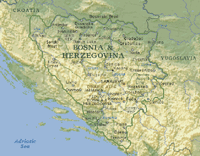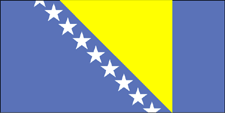| Background: |
Bosnia and Herzegovina's declaration of sovereignty in October 1991, was followed by a referendum for independence from the former Yugoslavia in February 1992. The Bosnian Serbs - supported by neighboring Serbia - responded with armed resistance aimed at partitioning the republic along ethnic lines and joining Serb-held areas to form a "greater Serbia." In March 1994, Bosniaks and Croats reduced the number of warring factions from three to two by signing an agreement creating a joint Bosniak/Croat Federation of Bosnia and Herzegovina. On 21 November 1995, in Dayton, Ohio, the warring parties signed a peace agreement that brought to a halt the three years of interethnic civil strife (the final agreement was signed in Paris on 14 December 1995). The Dayton Agreement retained Bosnia and Herzegovina's international boundaries and created a joint multi-ethnic and democratic government. This national government is charged with conducting foreign, economic, and fiscal policy. Also recognized was a second tier of government comprised of two entities roughly equal in size: the Bosniak/Croat Federation of Bosnia and Herzegovina and the Bosnian Serb-led Republika Srpska (RS). The Federation and RS governments are charged with overseeing internal functions. In 1995-96, a NATO-led international peacekeeping force (IFOR) of 60,000 troops served in Bosnia to implement and monitor the military aspects of the agreement. IFOR was succeeded by a smaller, NATO-led Stabilization Force (SFOR) whose mission is to deter renewed hostilities. SFOR remains in place at a level of approximately 21,000 troops. |







